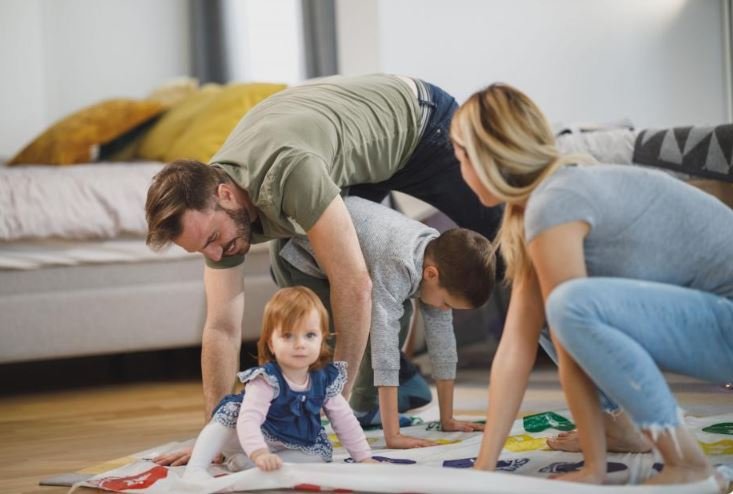
Keeping your toddler entertained while ensuring their growth and development can feel challenging, but it doesn’t have to be. With the right activities, you can keep your toddler happy, engaged, and learning all at once. In this article, we will explore simple and fun activities that support your toddler’s emotional, social, and cognitive development. These activities are not only enjoyable but also educational, making them perfect for busy parents looking to foster learning in a playful way.
1. Interactive Story Time
Reading to your toddler can be an excellent bonding activity while boosting their language and cognitive skills. However, to make storytime even more engaging, turn it into an interactive experience. Let your child guess what happens next, point out pictures, or ask them to finish a sentence. This practice encourages active listening and helps build vocabulary. By involving your toddler, you’re fostering a love for books and improving their language skills, setting the foundation for future learning.
Tip: Opt for colorful, picture-heavy books to capture their attention.
2. Sensory Play
Toddlers learn about the world around them through their senses. Sensory play, which involves activities that stimulate sight, sound, touch, smell, and taste, can help with cognitive development and fine motor skills. You can create simple sensory bins at home filled with safe items like rice, pasta, or water beads. Let them explore textures, sounds, and movements through touch and interaction.
Activity Idea: Create a “discovery box” by filling it with objects of different textures and materials like soft fabrics, sponges, and smooth rocks. Let your toddler explore these objects freely while discussing what they feel and see.
3. DIY Art Projects
Toddlers love expressing themselves creatively, and simple DIY art projects are perfect for fostering creativity and fine motor skills. Provide your child with basic art supplies like crayons, washable markers, or finger paints and let them create their own masterpiece. This kind of activity allows them to explore their imagination while developing hand-eye coordination and improving their ability to focus.
Tip: Try a theme like “draw your family” or “paint the sky” to guide them, and proudly display their work to build confidence.
4. Outdoor Exploration
Outdoor play is crucial for toddlers’ physical development. A simple walk around the neighborhood or park can be an adventure. Encourage your toddler to observe the world around them—point out birds, trees, or the changing colors of the sky. Outdoor activities build curiosity and help improve gross motor skills as they run, jump, or climb. Plus, fresh air and physical activity are great for your child’s health and mood.
Tip: Set up simple obstacle courses in your backyard or local park to keep them engaged while working on their motor skills.
5. Music and Movement
Toddlers naturally respond to music. Incorporating musical activities into their daily routine can be a fun way to develop their coordination, rhythm, and listening skills. Sing songs, play instruments, or simply dance together. You can even create musical instruments from household items like pots, pans, or empty bottles filled with beans. Music also helps toddlers express themselves and improves emotional well-being.
Activity Idea: Have a mini dance party where you play different types of music and encourage your toddler to move to the beat. It’s a fun way to release energy while developing their motor skills.
6. Building with Blocks
Building blocks are an excellent tool for teaching problem-solving, spatial awareness, and fine motor skills. Let your toddler stack, arrange, and create their own structures. As they experiment with different designs, they’ll learn about balance, structure, and even cause-and-effect. Blocks encourage independent play, but you can also join in to enhance the fun.
Tip: Try asking your toddler to replicate simple structures you build to challenge their observation and building skills.
7. Pretend Play
Pretend play allows toddlers to use their imagination while practicing social skills. Create simple scenarios, such as running a pretend grocery store, cooking in a play kitchen, or taking care of stuffed animals as “patients” in a doctor’s office. This type of play encourages creativity and helps toddlers understand the world around them through role-playing.
Activity Idea: Use old boxes to create a playhouse or a mini-shop where your toddler can “sell” their favorite toys.
8. Simple Puzzles and Sorting Games
Puzzles and sorting games are wonderful for developing a toddler’s problem-solving skills. Start with simple puzzles and gradually increase the difficulty as they become more confident. Sorting games, such as grouping objects by color, shape, or size, help with cognitive development and fine motor skills.
Tip: You can make a DIY sorting game by collecting everyday objects like buttons or bottle caps and having your toddler group them based on specific characteristics.
9. Cooking Together
Involving your toddler in simple cooking tasks is both fun and educational. Let them help with stirring, pouring, or even measuring ingredients. Cooking teaches toddlers about textures, colors, and numbers, while also boosting their fine motor skills. Plus, they get the satisfaction of creating something they can enjoy eating.
Tip: Start with easy recipes like smoothies or sandwiches to keep them engaged and build their confidence in the kitchen.
10. Water Play
Water play is a simple yet highly engaging activity for toddlers. Whether it’s in the bathtub, sink, or backyard, playing with water helps toddlers explore concepts like volume, flow, and buoyancy. It’s also a great sensory experience and a way to cool down on a warm day.
Tip: Add toys like cups, spoons, and floating objects to make water play even more entertaining.
Conclusion:
Engaging your toddler in simple and fun activities is a great way to keep them happy while encouraging learning and development. From interactive Storytime to creative DIY projects and sensory play, these activities are designed to stimulate your child’s mind while providing plenty of opportunities for growth. By incorporating these easy activities into your daily routine, you’ll ensure that your toddler stays entertained, learns new skills, and enjoys quality bonding time with you.

